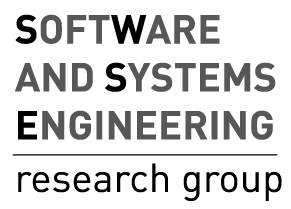Mission
The objective of the SETE stream is to research in innovative and educational techniques and tools to improve software development in production and educational ecosystems. Specifically, we target ideas, methods, techniques, and tools used to educate (i) professional software engineers, who develop and maintain software systems to meet schedule, cost and quality constraints and (ii) end-users, who are not paid to ship and maintain software over time, but write programs to support some goal in their own domains of expertise. This endeavour shall provide a better understanding, innovative techniques and tools for teaching software engineering, product assessment (also in non-conventional programming languages), technology enhanced learning.
Relevance
The group and its activities are relevant for:
(a) From a Research perspective, we aim at designing new best practices for software engineering training and education to educate both end-users and professionals. We use classroom based empirical research to measure the effects both of educational techniques and software engineering techniques.
(b) From an education point of view, since software development is becoming a pervasive practice, the areas of concern and competence of the SETE stream are fundamental for many educational activities not only for professional and end-user software engineers, but also for other domain disciplines, such as liberal and fine arts.
(c) From a technology transfer point of view, SETE research is a fundamental contributor to software engineering education, which narrows the gap between what is known in the research community and what is applied in industry, commerce, and educational environments.
Contact person:
Ilenia Fronza
Members:
Ilenia Fronza
Claus Pahl
Mahum Adil
Topics
End-user software engineering in different contexts (for example, in K-12)
New best practices for software engineering training and education
Technology enhanced learning
Empirical and experimental software engineering
Innovative curriculum or course formats
Software engineering as applied to other domain disciplines, such as liberal and fine arts
Continuous education to cope with technological changes
Software engineering in non-traditional settings (such as coding contexts)
Assessment of learning
Computational Thinking education
Product assessment also in non-conventional programming languages (for example visual, block-based)
Key Technologies
Technologies of Software and System Analytics
Adaptive learning systems
Related Courses
Software Engineering
Empirical Software Engineering Research
Applications
Tools and technologies for Learning, Teaching, and Assessment
Methods and Tools to Support collaboration / coordination during the software development process
Customization of professional tools/techniques for end-users
Activities
Courses in primary and secondary schools (for example, on computational thinking, robotics, etc.)
MobileDev summer school – PCTO (cooperative education)
Teacher refresher courses (for example, on computational thinking, robotics, etc.)
Facilitation of meetings and workshops using the LEGO® SERIOUS PLAY® method
Computational Thinking day (CTday): presenting the results of our courses in schools
Dissemination events
Partner Institutions
Intendenza Scolastica Italiana Provincia Autonoma di Bolzano
Deutsches Schulamt Autonome Provinz Bozen
Broadening Advanced Technological Education Connections (BATEC), University of Massachusetts Boston
Monterrey Institute of Technology and Higher Education, MX
University of Helsinki, FI
Partner Schools
Elementary schools:
Scuola Elementare di Terlano (BZ)
Scuola Primaria “A. Manzoni” (BZ)
Middle schools:
“Archimede” (BZ)
“Foscolo” (BZ)
“Calvino” (Egna)
“Dante” (BZ)
“Negrelli” (Merano)
High schools:
IISS “G. Galilei” (BZ)
Liceo delle Scienze Umane e Artistico “G. Pascoli” (BZ)
Liceo Scientifico “E. Torricelli” (BZ)
Liceo classico e Liceo linguistico “G. Carducci” (BZ)
Liceo Scientifico – sportivo “G. Toniolo” (BZ)
Liceo Scientifico e Linguistico “B. Russell” (Cles, TN)
Istituto Tecnico Costruzioni Ambiente e Territorio “Andrea e Pietro Delai” (BZ)
IISS “Gandhi” (Merano, BZ)
Liceo Linguistico “Marcelline” (BZ)
Istituto Tecnico Economic “Battisti” (BZ)
Istituto Tecnico Economico “Tambosi” (TN)
WFO “Franz Kafka” (Merano)
Realgymnasium (BZ)
Scientific Partners
Luis Corral (Monterrey Institute of Technology and Higher Education, MX)
Deborah Boisvert (University of Massachusetts Boston, MA)
Tommi Mikkonen (University of Helsinki, FI)
Petri Ihantola (University of Helsinki, FI)
Arto Hellas (University of Helsinki, FI)
Ongoing projects
COCONATS: COmbining COmputational thiNking didAcTics and Software engineering in K-12 (Free University of Bozen-Bolzano, Interdisciplinary call 2017, PI: Ilenia Fronza, co-PI: Claus Pahl)
TASTE: Training on Agile Software Development — Delivered using Agile Approaches (European Social Fund 2018, axis III Education, 5th call, PI: Ilenia Fronza, co-PI: Claus Pahl)
TANDEM: InnovaTive CS teAchiNg methoDs to foster kEy coMpetences (European Social Fund, axis III Education, 6th call, PI: Ilenia Fronza, co-PI: Claus Pahl)
EINSTEIN: dEfining practIces aNd prioritieS of end-users in ThE robotIcs domain (Free University of Bozen-Bolzano, RTD call 2019, PI: Ilenia Fronza)
AGILE: Exploring agile ways of teaching Agile (Free University of Bozen-Bolzano, RTD call 2018, PI: Ilenia Fronza)
Events
Opening ceremony of the ESF project TANDEM
MobileDev: Summer school (PCTO) for high school students on mobile development
Family Programming Challenge
Il piccolo programmatore at LUNA 2019
Robotics lab at Rendezvous mit dem Traumberuf
CTday

